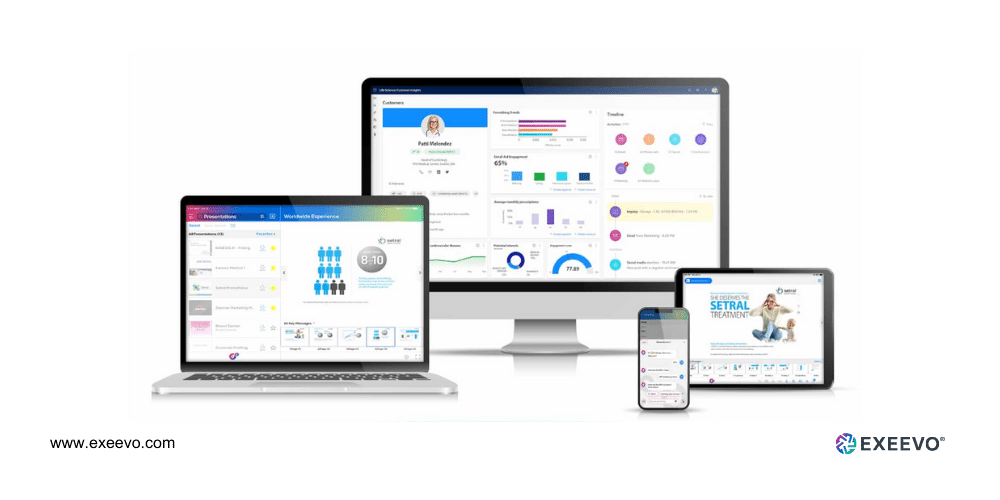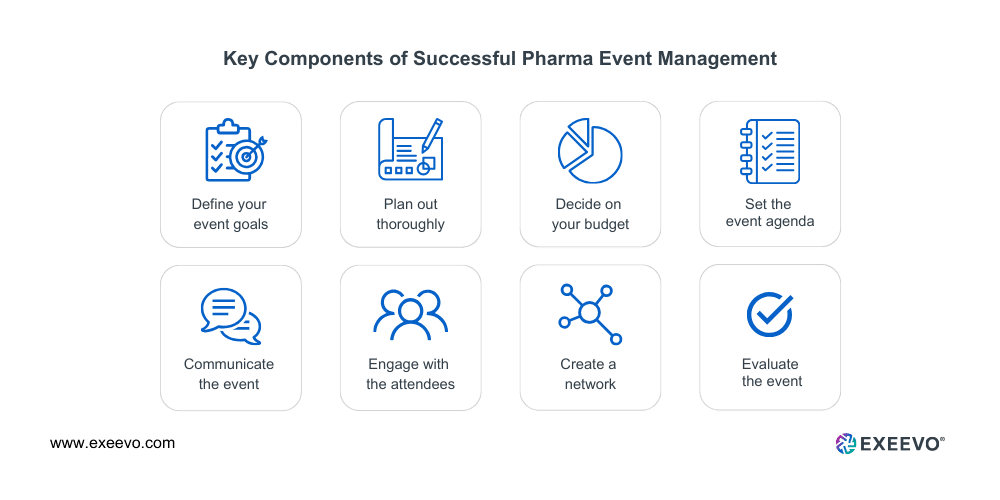Hosting regular pharmaceutical events can make a significant difference to your marketing game. But what makes a successful pharma event? It comes down to how you convey messages, launch products and network with professionals.
That’s where implementing a robust pharma event management solution comes into the picture. These solutions streamline event planning and execution and serve as a success driver for pharma events.
This guide will equip you with critical insights on successful pharma event management. Better yet, it will help you select the appropriate event management software.
What is Pharma Event Management?
Pharma event management is the planning and execution of events conducted in the pharmaceutical industry. Pharma events range from product launches to medical conferences. They require meticulous organization to ensure compliance, engagement, and effective communication among professionals, stakeholders, and the wider medical community.
80.4% of event organizers view events as the top marketing strategy for business success. However, the goals of pharmaceutical events can vary. They might aim to introduce new research, provide training sessions, or build relationships among professionals. For instance:
- Conferences serve as platforms where industry experts share recent advancements.
- Internal events help to encourage team-building and align company goals.
- Sales kick-offs invigorate teams and set the tone and direction for commercial strategies.
- Product launches share new drugs or medical equipment.
- Workshops and training sessions provide professionals with hands-on experience.
Managing all these events well can play a significant role in meeting a pharmaceutical company’s objectives.
Why is Pharma Event Management Important?
Pharma event management is a catalyst for achieving key objectives within the pharmaceutical sector. It facilitates communication, learning, and marketing goals, among others.
Through these events, pharma companies share vital information about drug advancements, research findings, and healthcare solutions. It also opens doors for professional networking and creates brand awareness.
Let’s have a look at three reasons that make pharma event management a must:

1. Streamlined Event Planning and Execution
Implementing a pharma event management solution creates a centralized hub for all event-related tasks, schedules, resources, and payments, which simplifies the planning process. Automation takes over manual tasks such as registration, agenda management, marketing campaigns, and communication. It reduces administrative burden and minimizes errors.
Think about it: looking through multiple platforms for scheduling, registration, or communication is unnecessary. Every detail, from the guest list to the day’s agenda, resides in a single system.
For example, SANOFI China was facing operational challenges due to outdated systems. They implemented our Omnipresence CRM for managing field sales operations and events. This transition enhanced decision-making and improved compliance with data transfer laws.
2. Real-Time Monitoring and Adaptation
Events are often dynamic and unpredictable, so having a real-time system that tracks every movement becomes invaluable. Immediate feedback means event organizers can make swift decisions. You can take immediate remedial action if a session becomes too crowded or a technical glitch occurs. This live feedback loop ensures that no issue goes unresolved for too long.
The industry is always progressing as well. It presents fresh challenges and trends. Pharma event management companies can arm your event managers with real-time data to spot these emerging patterns and act promptly.
For instance, if attendees show more interest in a particular topic or speaker, you can make adjustments on the fly. It can mean allocating a larger venue or scheduling an encore presentation.

3. Enhanced Attendee Engagement
Attendees expect more than passive listening. They seek active participation. They can access event details right at their fingertips through features like mobile apps.
- Live polls turn monologues into dialogues. They capture instant feedback and make attendees feel like their opinions matter.
- Q&A sessions add another layer of interactivity that allows direct engagement between speakers and attendees.
- Nobody likes last-minute surprises. So, real-time notifications ensure attendees stay informed.
Whether it’s a change in the schedule or a vital announcement, these instant updates mean attendees are always in the loop.

Key Components of Successful Pharma Event Management
Creating a memorable pharma event requires precision, clarity, and foresight. As the pharmaceutical industry evolves, so does the importance of well-organized events that deliver value to participants.
Whether you aim to share research findings or launch a groundbreaking product, the foundational principles remain the same. Here’s a streamlined approach to four essential components for success.

1. Define Your Event Goals
Clear goals set the course for event success. These objectives guide every planning decision for a cohesive and purposeful experience. With the help of a pharma event management company, you can define goals to track and assess an event’s impact. For instance:
- An event focused on brand awareness aims to leave an imprint on attendees.
- Education-oriented events prioritize knowledge dissemination.
- Networking events aim to cultivate connections among industry professionals.
- Product launches spotlight innovations.
Each goal shapes the event’s structure and content and guarantees alignment with its core purpose. These defined objectives later serve as metrics for evaluating the event’s success.
- Did the event amplify brand recognition?
- Did it result in fruitful networking or enlighten the attendees as intended?
Having precise goals enables a thorough post-event evaluation.

2. Plan Out Thoroughly
Thorough planning is the backbone of successful pharma meeting management and event logistics. It sets the groundwork for everything that follows.
- First, you select the right venue. It should be accessible, accommodating, and reflective of the event’s ethos.
- Then, you choose a date. It shouldn’t clash with other industry events and is convenient for the attendees.
- Finally, you decide on the event format. It can be a workshop, a seminar, or a product launch.
Beyond these logistical aspects, you must align the event’s objectives with the company’s broader goals. For instance, if you aim to promote your standing in the oncology domain, you must tailor your event to highlight the company’s contributions and aspirations in that field.

3. Decide on Your Budget
A study by Gartner indicates that cost optimization is key for modern data management programs.
The budgeting process begins by estimating the total funds available and forecasting expected costs. Once set, it acts as the event’s financial roadmap. Fund allocation varies based on event type and objectives.
- The venue consumes a significant portion and elements like catering follow the trail.
- Marketing takes another good chunk, as it helps ensure a good turnout. It might involve costs for digital campaigns, printed materials, or even public relations efforts.
- Entertainment, though overlooked, adds value and can set your event apart.
Here are some effective budget management tips:
- Prioritizing needs
- Getting multiple quotes
- Setting aside a contingency fund
- Regularly reviewing and adjusting
A well-planned budget can ensure the event’s quality while safeguarding against needless spending.

4. Set the Event Agenda
Creating a compelling event agenda is a thoughtful process that requires a keen understanding of the audience’s interests and the event’s objectives. For a pharma event, the agenda should address current issues, trends, and advancements in the field.
- Educational sessions are the backbone of pharma events. They offer a platform for sharing knowledge, the latest research findings, and industry advancements.
- Workshops provide a hands-on approach to learning. They allow attendees to engage with the content on a deeper level.
- Interactive sessions are significant, too. They promote engagement, provoke thought, and encourage dialogue among attendees.
Balancing informative content with engaging activities is essential. It ensures the event is not just a learning experience but also an opportunity for networking, discussion, and collaboration.

5. Communicate the Event
Communicating your pharma event the right way can draw the right audience and create a buzz in the community. Thus, you need to use digital marketing avenues.
- Tailored social media campaigns spotlighting the event’s themes and notable speakers can generate early interest.
- Email campaigns, segmented for different audience groups, allow personalized messaging and reminders.
- Industry partnerships can widen your reach as you leverage mutual networks to promote the event.
- Creating engaging event content and disseminating it through various channels will further elevate the event’s profile.
The earlier and better you communicate the event, the higher engagement you can expect.
6. Engage with the Attendees
A meaningful connection with attendees amplifies event success. You can encourage attendees to be more involved through interactive sessions. Q&A panels serve dual purposes:
- They clear uncertainties
- They show the audience that their concerns matter
Audience participation techniques, like live polls or hands-on workshops, can further elevate the experience. For instance, a pharmaceutical event focused on a new drug might feature real-world simulations. It will let attendees experience the drug’s impact firsthand. Activities like these will break the monotony and enhance the comprehension of complex topics.
7. Create a Network
Networking opportunities allow professionals to connect, share insights, and foster meaningful relationships. Pharmaceutical events are good grounds for such interactions.
- Structured sessions enable focused discussions on specific topics.
- Breakout rooms encourage smaller, more personal conversations.
- Informal interactions during breaks or social events spark unexpected insights.
Facilitating a variety of networking scenarios broadens the scope of collaboration and knowledge sharing. Providing attendees with clear objectives and preparation material beforehand can enrich the networking experience.
Post-event follow-ups are also important. They help you solidify the connections so that you have a productive and rewarding networking outcome.
8. Evaluate the Event
Evaluating the success of an event can help you refine future strategies. This helps to ensure each event is a step forward in engagement and impact. Post-event reporting, which includes data analysis and attendee surveys, helps you understand the event’s reach and the audience’s response.
Data gathered from attendee interactions, feedback forms, and digital footprints provides a lens to scrutinize every aspect of the event. The feedback obtained can be a goldmine of information. It reveals what resonated with the audience and what fell flat.
The Role of Technology in Pharma Event Management
Digital transformation is fundamental to the growth of the pharma sector. It streamlines operations and promotes development. As part of this evolution, pharma event management software emerged as a key tool. This tool helps you manage events with optimal engagement and knowledge transfer.
The digital health industry, valued at $211.0 billion in 2022, is expected to grow at an 18.6% CAGR from 2023 to 2030. Adopting tools such as customer experience management (CXM) brings pharma companies into the modern era. It fine-tunes client rapport and enhances the brand’s standing.
Let’s explore key areas where technology leaves its mark in pharma event management:
[Image Guide] Exeevo CRM UI Screenshot, specifically for pharma event management.
1. Functionality and Features
Evaluating the functionality and features of event management software is a critical step to ensuring a perfect fit for pharmaceutical events. Such events have distinct needs that necessitate specific software capabilities. Some important features include:
- Event registration simplifies the process of attendee sign-up, ensuring a smooth start to the event.
- Agenda management helps structure and disseminate the event schedule in an organized manner.
- Attendee networking facilitates meaningful interactions among participants in a collaborative environment.
- Marketing tools
- Interactive sessions engage the audience with interactive discussions, live polls, and Q&A sessions.
- Speaker engage to pay
- Event reports and financials
2. Integration and Customization
Seamless integration with existing systems ensures smooth operations. It also reduces the learning curve for teams. On the other hand, customization allows for a unique brand portrayal.
When Veeva Systems and Salesforce ended their partnership, many pharma CIOs were in a dilemma. Such changes highlight the importance of a unified tech platform for smoother transitions. Here are some key points to look for:
Integration Possibilities:
- CRM integration for better attendee data handling
- ERP integration for efficient resource management
- LMS integration to track and manage educational content
Customization Features:
- Branding customization: Tailoring the interface with brand colors, logos, and themes
- Event-specific customization: Adapting features to cater to the unique requirements of each event
- Functional customization: Customizing the functionality to meet specific organizational needs ensures smooth and effective event execution
A single-license framework offers seamless tech stack integration. It ensures smooth experiences for commercial teams. Such structures can mitigate the challenges of unexpected partnership disruptions, like the Veeva-Salesforce scenario.
3. Data Security and Compliance
When selecting software for managing events, adherence to data protection regulations specific to the pharma sector is non-negotiable. A breach in data security can have significant reputation and legal consequences. Here are some essential security measures and compliance certifications to look out for:
- Encryption: Encrypting data at rest and in transit to ensure it remains inaccessible to unauthorized entities
- User authentication: Robust authentication mechanisms to verify the identity of users accessing the system
- Access controls: Defining who gets access to what data
- Audit trails: Keeping a reliable and traceable record of who accessed what data and when
- Compliance certifications: Look for certifications like HIPAA, GDPR, or other relevant local data protection laws
4. Mobile Accessibility
Attendees and organizers benefit from mobile-friendly features. It enables a fluid exchange of information and real-time updates. Implementing mobile technologies like event apps and embracing responsive design are steps towards elevating the attendee experience. Here are some key mobile features:
- Real-time notifications keep attendees informed about the latest updates, schedule changes, or urgent announcements
- Offline access provides vital information even in the absence of an internet connection
- Personalized schedules allow attendees to tailor their event itinerary
- Live polls and Q&A engage attendees during sessions
- Feedback collection streamlines the process of gathering valuable feedback for post-event analysis
Incorporating mobile accessibility addresses the changing nature of pharma events. It also aligns with the modern-day expectations of attendees.
5. Client Support and Training
Robust client support and training from the software provider ensure a smooth implementation and uninterrupted flow during events. Adequate support tackles unforeseen issues. Support must be accessible for a convenient experience. Various channels facilitate this:
- Phone support: Direct line to experts for immediate help
- Email support: Documented assistance for non-urgent issues
- Chat support: Instant online assistance during event planning and execution
Additionally, a suite of training resources can equip the clients with the necessary knowledge:
- Webinars to cover key software functionalities
- Training manuals for self-paced learning
- Video tutorials for a better understanding
Future Event Management Trends

The journey through successful pharma event management highlights a necessity: a thorough evaluation of the event management solution chosen. The right technology streamlines operations, encourages engagement and propels brand growth.
These elements will refine pharma event management as we step into the future. They will set a benchmark for excellence and innovation in the industry.
Exeevo stands out with its Omnipresence CRM tailored for the Life Sciences sector. Exeevo helps you ensure successful pharma event management and meaningful engagement.
For an in-depth understanding of how Exeevo can elevate your event management, click through to our contact page.
For further insights on CRM solutions and digital transformation in Life Sciences, read more here.
